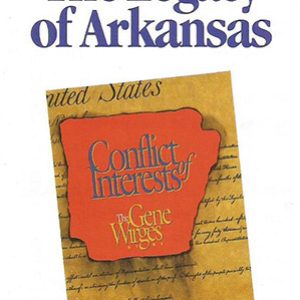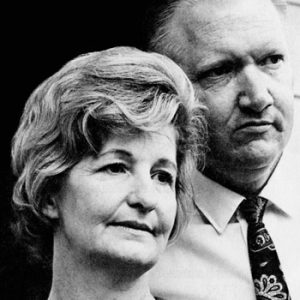calsfoundation@cals.org
Gene Wirges (1927–2014)
Eugene Henry (Gene) Wirges was an Arkansas journalist noted for his crusade against the influence over Arkansas politics exerted in the early 1960s by Governor Orval Faubus and his political ally Sheriff Marlin Hawkins of Conway County. As a crusading editor and good-government advocate, Wirges, along with his wife, Betty, allied themselves with the forces of reform at serious personal risk. Principally as editor of the Morrilton Democrat, as well as other local papers, Wirges led a campaign for better government and honest elections, which resulted in lawsuits, criminal prosecution, physical altercations, and—allegedly—a contract on his life. His opponent and chief nemesis, Hawkins, vehemently denied being involved in such activities.
Born in Little Rock (Pulaski County) on December 5, 1927, Gene Wirges was one of four sons born to Joe Wirges and Elizabeth Wollhower Wirges. His father was a renowned reporter covering the police beat for the Arkansas Gazette for many years.
Between 1943 and 1957, Wirges was a reporter/photographer for the Arkansas Gazette, sports editor for the Jonesboro Evening Sun, and news editor for the Paragould Daily Press. In 1947, Wirges married Betty Carter of Little Rock; they had three sons and two daughters. In 1957, Wirges and his wife bought a small country newspaper in Morrilton (Conway County), planning to live the comfortable life of small-town editors/publishers.
However, in 1960, a group of five concerned citizens contacted Wirges regarding their attempt to recall three board members of the Wonderview School District No. 2 and their fears of a rigged election. Upon investigation, Wirges discovered irregularities in voting and supervision of elections which, he was told, went to the very heart of county government, especially in the person of the county sheriff, Marlin Hawkins, a longtime Conway County politician allied with Governor Faubus.
At first, Wirges began to notice some resistance to his efforts and the loss of advertisers upon publication of some of his findings. Undeterred, his further investigation showed what he believed to be far-ranging corruption, both locally and in neighboring counties, through an extended network of Faubus and Hawkins allies and confederates, which he exposed in his newspaper. “Once war was declared, Wirges waged it with unabating belligerence,” wrote Time magazine in its September 22, 1961, issue.
In June 1961, the Catholic Point township in Conway County reported a vote of 93–2 in favor of the political machine candidate. Wirges interviewed voters, and far more than two stated they had voted against the machine candidate. More than a dozen gave affidavits to this effect. When he published this story, no corrective action was taken by either state or local authorities. The Wonderview and Catholic Point incidents signaled the beginning of Wirges’s crusade for better government.
The City of Morrilton was likewise controlled by the Hawkins faction. The Democrat ran a story alleging that, after two defeats on a referendum for new sewer taxes, the Hawkins-controlled aldermen voted to spend the money anyway. As a result, the Democrat backed a movement to reform city government by proposing a city manager/board of directors–type of government, but the movement failed.
Reprisals were swift. Without effective notice, Hawkins, as sheriff and tax collector, posted a “notice of tax sale” on the door of the Democrat for non-payment of taxes in 1961. Wirges, however, was able to prove that he had an extension for the taxes and thus avoided the sale. He did not, however, avoid being beaten as a result of this incident by the tax assessor, W. O. “Bus” Hice, while walking down Moose Street in downtown Morrilton. Wirges suffered a concussion in the altercation, and Hice was convicted in Municipal Court and fined $32.50.
The war between the good government forces and the alleged machine continued unabated for several years thereafter. At one point, Wirges had at least fifteen legal actions pending by or against him in the courts. He was sued for libel twice by elected county officials, and judgments totaling $275,000 were levied against him. He was furthermore criminally indicted seven times by three grand juries and sentenced to three years in prison when convicted of alleged perjury in the first degree. Those charges were ultimately dismissed by the Arkansas Supreme Court as being unproven. However, as a result of the legal wrangling and tax allegations, Wirges lost control of the Democrat for a time in 1964, but he ultimately was restored as its editor through the intervention of reform-minded citizens, as well as attorney G. Thomas Eisele (later a U.S. district judge) and Winthrop Rockefeller.
On a more sinister note, in 1966, State Trooper Jack Stone was allegedly dispatched as a sniper to kill Wirges but was unsuccessful in setting up the kill. When Stone came to a parting of the ways with Hawkins, he thereafter informed Wirges of the alleged plot against him. By then, an investigation was under way on an alleged speed trap and DWI scam operated by the sheriff’s office. Stone turned over evidence and gave critical testimony himself in a 1968 speed trap trial. Wirges’s investigative evidence gathered about the scam was confirmed in that trial, and Hawkins was removed from office temporarily. On more than one occasion, friends of Wirges guarded his home and business with shotguns.
The election of Wirges’s benefactor and ally, Winthrop Rockefeller, as governor in 1966 loosened the grip of the local machine politics. Hawkins subsequently retired from office, claiming victory over “that editor.” Faubus himself exited the governor’s office after six terms in 1967 and held no further political offices. Wirges’s old foe Hawkins published an autobiography in 1991—How I Stole Elections—with University of Arkansas at Little Rock history professor C. Fred Williams in which he maintained that he got nearly everyone to vote for him by being an extraordinary servant of the people; the book was not complimentary to Wirges.
Retired in 1988, Wirges continued in journalism—writing books and using the Internet to blog about issues and his observations on state and national politics.
In the early Rockefeller years, before Rockefeller became governor, Wirges had formed a close alliance with Everett Ham, an early aide who helped Rockefeller develop ties with the moribund and conservative Republican Party, preparatory to taking over the party and making four races for governor. Wirges and Ham shared an inclination for sweeping conspiracy theories about such enemies as communists and Bill Clinton. In 1992, Wirges published a book critical of Clinton called Conflict of Interests: The Gene Wirges Story, with the tagline Power Politics: The Legacy of Bill Clinton.
Wirges died in Little Rock on June 19, 2014.
For additional information:
Hawkins, Marlin, and C. Fred Williams. How I Stole Elections: The Autobiography of Sheriff Marlin Hawkins. Morrilton, AR: 1991.
Reed, Roy. “How to Lynch a Newspaper.” The Atlantic (November 1964). https://www.theatlantic.com/magazine/archive/1964/11/how-to-lynch-a-newspaper/659015/ (accessed March 15, 2024).
Wirges, Gene. Conflicts of Interest: The Gene Wirges Story. North Little Rock, AR: Riverboat Publishers, 1992.
“Wirges Sees ‘Covering Up’ of Conway County Situation.” Arkansas Gazette, February 2, 1964, p. 2A.
“Wirges Still Hoping to Regain Paper.” Arkansas Gazette, January 19, 1964, p. 6A.
David Bowden
Little Rock, Arkansas
 Mass Media
Mass Media World War II through the Faubus Era, 1941 through 1967
World War II through the Faubus Era, 1941 through 1967 Wirges Book
Wirges Book  Gene Wirges
Gene Wirges  Betty and Gene Wirges
Betty and Gene Wirges 




Gene Wirges tried to get Bill Clinton thrown off the ballot (and investigated by the FBI) based on conspiracy theories that Clinton was a communist and a traitor, and Wirges was loosely involved in the Arkansas Project with Everett Ham.